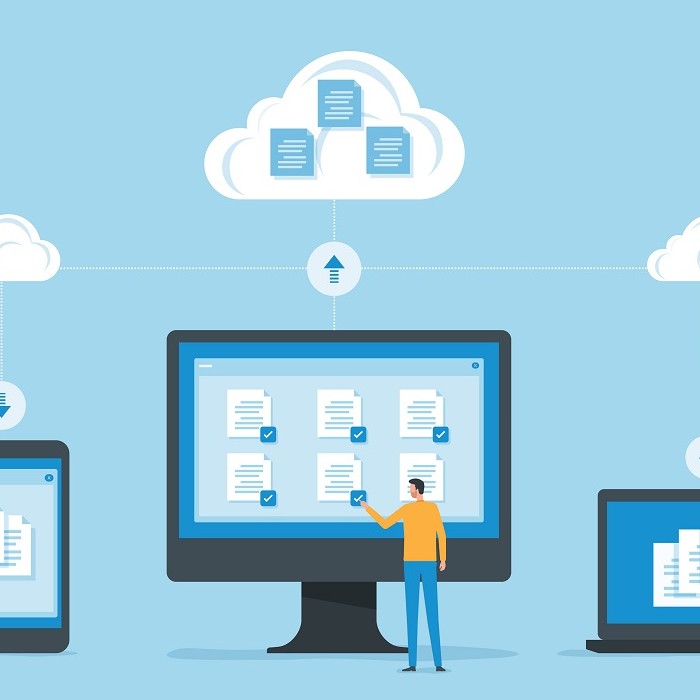Companies need a reliable and responsive platform on which to run, develop, and deploy software and internal workloads. While this reality is nothing new in the IT space, the role of platform engineer is a recently emerging position that serves to satisfy this demand through standardized responsibilities and methodologies. Platform engineering is a promising career that IT professionals can expect to see on the rise for the foreseeable future.
Companies looking to adopt new platform engineering solutions can make the transition easier by implementing outside services in tandem with platform elements designed in-house. A hybrid cloud IT approach empowers a company leverage owned, hosted and public cloud computing resources. A dedicated platform engineer collaborates with software developers to provide the right IT resources to build then run their applications and data.
What is a Platform Engineer?
According to Gartner, platform engineering involves the implementation of reusable tools and self-service capabilities with automated infrastructure operations as a means of improving the experience and productivity of developers.
A platform engineer is, therefore, an IT professional who creates and maintains a platform designed to support the needs of software developers and other personnel involved in the process of deploying workloads or applications.
Gartner projects that 80% of software engineering organizations will establish internal platform teams by 2026. While investing in platforms as a service is an option for organizations interested in outsourcing the management of this complicated aspect of the IT environment, internal platform engineering can be a solution for the lack of cooperation between software developers and platform operators.
Source: Gartner
The overlap in responsibilities for platform engineers and software developers
The relationship between platform engineers and software developers is one of collaboration. The teams communicate regarding priorities, and the platform engineers ideally deliver and support the platform developers' needs as a product.
The Emergence of Platform Engineering
Platform engineering as a dedicated field is still an emerging trend, but companies yet to adopt a dedicated platform engineering solution might already have one or more individuals fulfilling this role.
The need for an effective platform on which to develop or deploy software is as old as the concept of software itself. It is unsurprising, then, that some IT engineers within software companies take it upon themselves to develop or maintain the organization’s platform regardless of whether it is part of their job description.
These “rogue” platform engineers are the unsung heroes of their organizations, but relying on them is an inefficient practice for enterprises. Platform engineering is becoming increasingly essential, so it is important to invest in a team of engineers with skills and responsibilities that are in line with new industry standards.
Platform engineering has its origins in a quiet, often-unspoken necessity for many companies and their software teams, but it is on the rise to become a recognized and sought-after skill set with the potential to improve operations for organizations all across the tech sector.
When Platform Engineering Becomes a Necessity
Creating a platform engineering team, as well as onboarding or training dedicated platform engineers, requires a certain investment of resources on an organization’s part. However, a company with noticeable problems in productivity and deployment efficiency might struggle to justify not having a platform engineer on staff.
Using on-premises legacy systems entails relying on custom tools designed for building and maintaining an organization’s individual platform and accommodating its unique quirks. Platform engineering teams can help facilitate the transition to a more standardized cloud environment.
Many modern applications run natively in the cloud, so migrating to a cloud solution is a natural progression for growing enterprises. The use of cloud-based platforms also imposes the use of standardized resources that a company’s platform engineering team is more likely to be familiar and comfortable with.
Organizations making the transition toward adopting platform engineering and cloud solutions have the decision of whether to invest in a multicloud environment. Diversifying one’s operations allows for the use of the right public cloud for each task, and the input of a dedicated platform engineer can inform a business leader’s decision on which vendors to collaborate with to build a suitable multicloud solution.
While there is no replacement for an in-house platform engineering team that can respond to the organization’s specific needs, the option does exist to invest in platforms as a service. For example, the Nutanix KPS is a PaaS solution that eliminates the complexity of operating on the Kubernetes system while also providing self-service capabilities to users.
Another prudent option that companies can opt for is the diversified approach of running certain applications on an in-house platform while outsourcing the management of other workloads to a PaaS or IaaS provider.
The creation of an efficient developer environment
When a platform engineer sets out to create the developer environment, there are a few key factors to consider from the outset. Load-balancing and deployment are crucial processes to optimize, and the scalability of the platform is a priority as well.
Developers also require automation where possible to streamline their workloads. Automated disaster recovery, for example, takes a huge burden off the minds of developers throughout the process. Developers also need to be able to configure the platform as needed, though engineers must keep in mind that the complexity of the underlying system should remain behind an accessible and easy-to-use interface.
These goals for which a platform engineer should strive become possible through the creation of an internal developer platform. Building, maintaining, and updating this IDP according to the needs of the development team eliminates the necessity for engineers to be on call to solve problems. Instead, the platform enables self-service on the developer side.
It is also possible to integrate managed services when building an internal developer platform. The platform engineer can implement custom solutions for load-balancing and other elements while also outsourcing the management of cloud processes to an outside vendor, for example. Doing so somewhat lessens the convenient self-service aspect of a fully custom-made platform but can make the build more affordable.
Developers can scale up the platform when the engineering team successfully enables infrastructure as code. Through the IaC process, the platform user can define necessary infrastructure changes via code, which the tool will then execute. The use of coding also implies the possibility of further automating workloads to the extent of redefining the infrastructure as part of the automated process.
Software Engineering Daily
Pyramid illustrating infrastructure as code as the foundation for platform engineering, developers, and application features
How platform engineering relates to DevOps
Platform engineering shares key similarities with the concept of DevOps but differs in some significant regards that warrant the recognition of the two as separate fields. However, it is also important to acknowledge the role that the DevOps philosophy plays in the origin of platform engineering as a practice.
DevOps refers to the culture, tools, and practices that contribute to the automation and integration of processes between software developers and other IT teams. In other words, it facilitates collaboration, communication, and the elimination of friction between teams in the IT setting.
By the definition of DevOps, one could argue that a platform engineer is a part of the DevOps ecosystem, though clearly not all DevOps practices fall under the umbrella of platform engineering.
The concept of DevOps predates the rise of the platform engineer as a standalone position in the IT space, and the term DevOps typically implies a direct interaction between software developers and engineers. The principle behind platform engineering, on the other hand, is the creation of a platform equipped with self-service functionality that developers can use to resolve issues without the need to frequently reach out to the engineer.
Modern IT teams have a need for both DevOps and platform engineers. Some issues still require direct collaboration between developers and engineers, but engineers also require the opportunity to work more proactively to make the most of their skill sets. This is possible when the platform itself replaces the engineer as a bridge between developers and the underlying infrastructure.
Pursuing the Platform Engineer Position
As employers come to acknowledge the importance of platform engineers during an era when digital transformation is crucial for future-proofing operations, individuals seeking a career in the IT field may recognize an opportunity worth seizing.
Becoming a platform engineer requires familiarity with IT infrastructure and developmental processes, as the platform serves as a bridge between the teams specializing in those fields. A versatile platform engineer should also know multiple programming languages and have insight into various online systems.
Prospective platform engineers should also be aware that the position is a collaborative one. Those who build the platform do so for the benefit of developers and other teams and must be open to feedback and requests that will make workloads more efficient for each party. Organizations are opening up to the value of entire platforming engineering teams as well, meaning that the position is not likely to be a solo endeavor at any point in the process.
The IT space is large, complex, and ever-growing. Some projections indicate a growth in the IT job market at twice the rate of other industries through 2023 and beyond. Opportunities abound for individuals with interest and experience in any specific niche from development, engineering, and everything in between. The ongoing rise of the platform engineer is just one of the latest trends exemplifying this reality.
Learn more about how the Nutanix Cloud Platform simplifies DevOps and related processes, as well as how the Nutanix infrastructure can accommodate cloud native platforms and systems.
Michael Brenner is a keynote speaker, author, and CEO of Marketing Insider Group. Michael has written hundreds of articles on sites such as Forbes, Entrepreneur Magazine, and The Guardian and he speaks at dozens of leadership conferences each year covering topics such as marketing, leadership, technology, and business strategy. Follow him @BrennerMichael.
© 2023 Nutanix, Inc. All rights reserved. For additional legal information, please go here.








